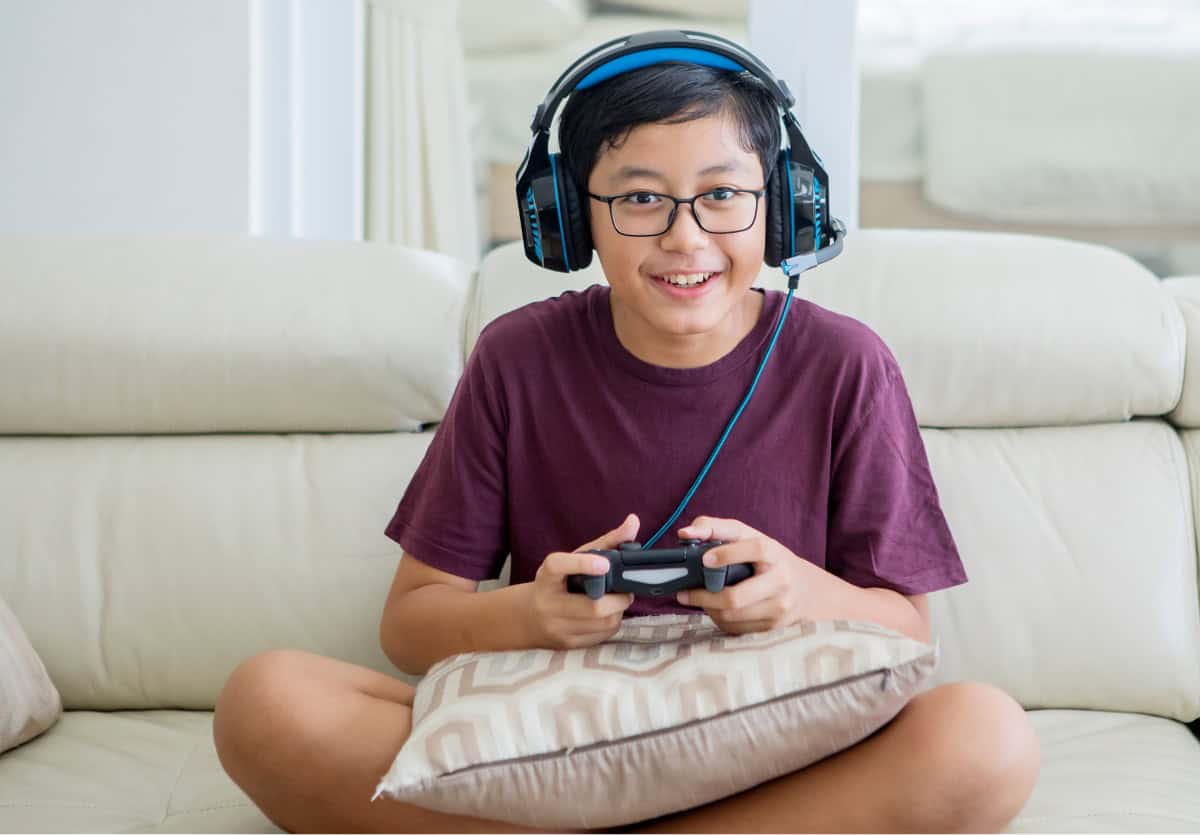
Love it or hate it, these days, kids love to game. They play on iPads, iPhones, laptops, and desktops. They game alone in their rooms or they game in a room full of friends. And while, certainly, there are concerns with excess screen time or absorbing disturbing content, video games undeniably have a place in the modern world. They’re fun, more social than ever, and they can be extremely educational.
From learning to code to basic hand-eye coordination, video games teach kids a ton. Still, experts warn that if you’re allowing your kids to play video games, or thinking about setting them up with the console of their dreams this holiday season, there are some considerations to think about first.
“These days, protecting your children from gaming addiction isn’t the mammoth task it used to be,” game developer and CEO of FreezeNova Games Marin Cristian-Ovidiu says. “There are a lot more tools out there to help with setting boundaries and responsible gaming.” However, it’s best to start using these tactics early because once bad habits are put into place, they can be tough to break.
Here are five practical strategies parents can use to ensure gaming safety for kids and encourage healthy gaming habits:
1. Play the game with them
For starters, you can join in on the fun. Cristian-Ovidiu says that playing the game your child enjoys with them is a great bonding activity, can help ensure the game is age-appropriate, and will teach you about something your child loves, too. Cristian-Ovidiu issues a warning for parents, though. “Now I’ve seen some parents take this step a bit too far and end up becoming the ones addicted. Avoid over-reliance on this step and dedicate a bit of time studying your child’s gaming habits. It will help in the long-run,” Cristian-Ovidiu says.
2. Don’t let them keep devices in their rooms
Experts have long advised that kids don’t have TVs in their own rooms. But these days, a lot of kids have other screens in their rooms, or in their hands at all times, meaning there may not be a lot of time when they aren’t using screens.
When it comes to worries about screen addiction, or even inactivity, that worries experts. Cristian-Ovidiu says, “Before investing in any console, make sure you know how to set it up and move it around. If it’s taking too much of a toll on you and your child’s relationship, maybe allow it in the bedroom on the weekends or on special occasions, and set a curfew.” Likewise, you can create a gaming space somewhere else in your home, like in the kitchen, or the living room, to encourage socialization.
3. Only purchase age-appropriate games
These days, video games are, er, graphic. Some of them are downright gruesome, violent, or profanity-filled. If that’s a concern, make sure you stick to games that are age-appropriate. You can do so by checking ESRB (Entertainment Software Rating Board) or PEGI (Pan European Game Information) ratings to identify whether a title is suitable for your child’s age. Cristian-Ovidiu says, “Platforms like Common Sense Media and InternetMatters.org provide detailed reviews and recommendations for parents, outlining not just age ratings but also educational value, violence levels, and overall appropriateness, making sure your child’s gaming experiences remain fun and enriching.”
4. Keep them engaged in other activities
Gaming is tons of fun, but these days, modern games can be too engaging. If you start to notice that playing video games is all your kid wants to do, there could be trouble brewing. Keeping your kids engaged in other activities, like sports, or even having screen-free time with friends, is essential in combating gaming addiction. “Encouraging alternative activities will see to it that gaming doesn’t become the sole focus in a child’s life, creating a more well-rounded and fulfilling childhood,” Cristian-Ovidiu explains.
5. Explain the concerns around gaming
Kids who are making a habit of gaming should be well aware that there are consequences for doing little else. Explain your concerns to your child, using age-appropriate language. Let them know that having their devices is a privilege and they need to respect that.
“Kids are usually more mature than you think,” Cristian-Ovidiu says. “A calm sit down with them to explain things instead of chastising them can help them see things for what they are and promote healthy behavior. And if they can’t see things maturely, make sure you follow through on the consequences, be it no gaming for a few days, weeks or even a month.”
It’s important to remember that gaming is truly not all bad. And some kids absolutely have a knack for, not just playing games, but creating and inventing while playing. That means they could be the future video game designers. Still, that doesn’t mean they don’t need rules. “Preventing gaming addiction in your kids requires a blend of consistency, communication, and adaptability,” says Cristian-Ovidiu. “As parents, you need to help guide your children to develop healthier habits around gaming.”
Also, be sure to check out FreezeNova Games for fun, inventive options you won’t have to stress over.






